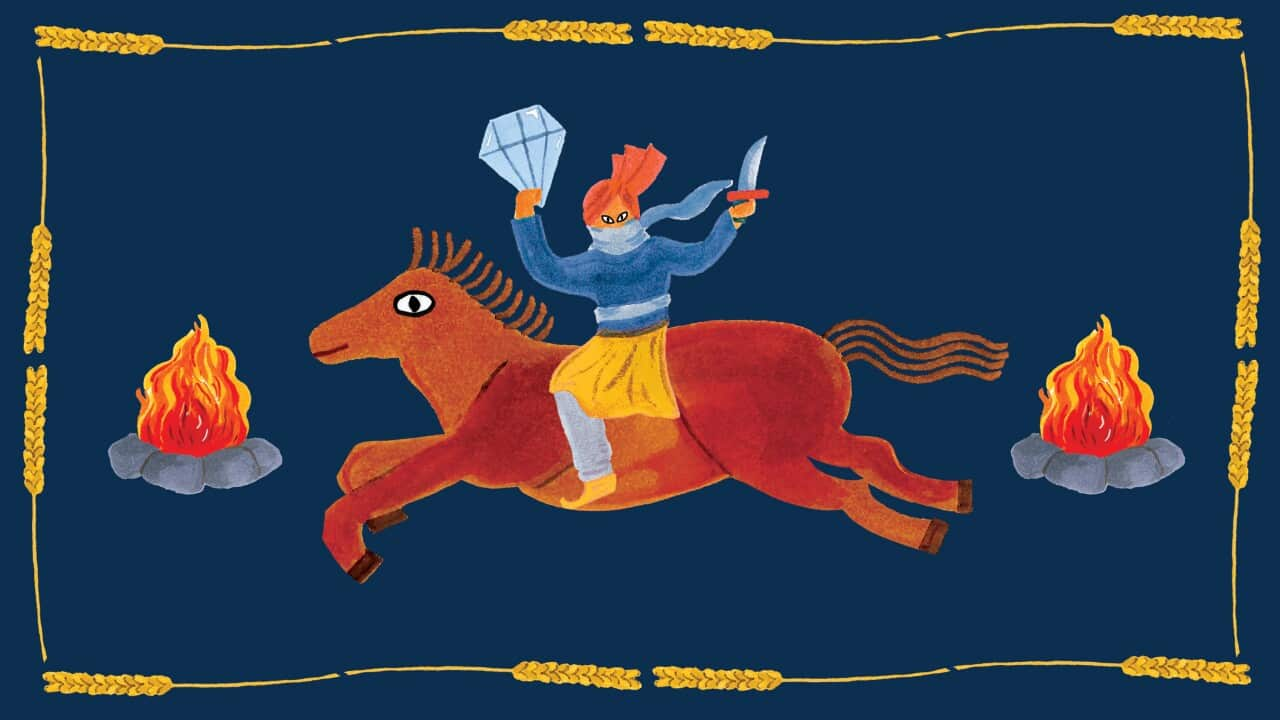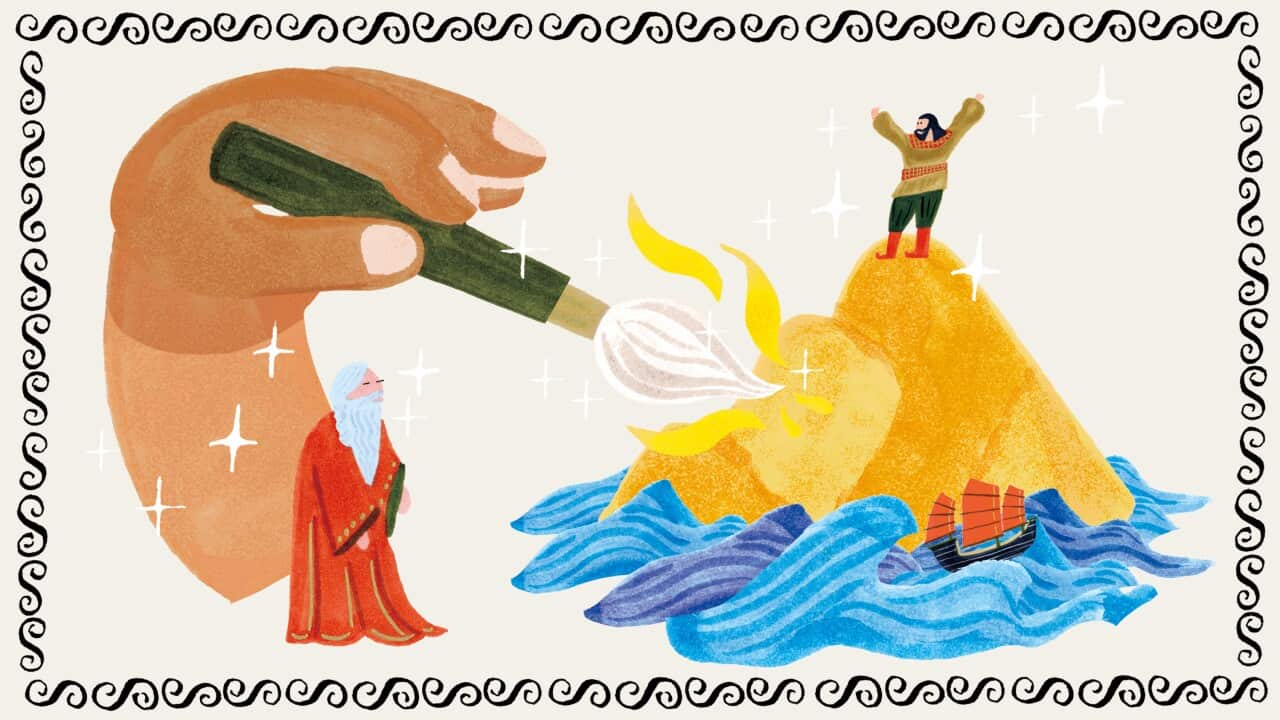This story comes to us from the Punjab region of South Asia.
It’s about a young person who lives in a forest, robs the rich, and gives to the poor.
If this sounds familiar to you… well, that’s why Robin Hood is known as 'the English Dullah Bhatti'.
Host and narrator: Alice Qin
Story consultant, translation, voices: Sumeet Kaur
Story editor: Marcel Dorney
Translation and voices: Preetinder Grewal Singh
Voices: Ala'a al-Tamimi, Paras Nagpal
Recording engineer: Vlad Ladgman
Executive producer, sound design and music: Kieran Ruffles
TRANSCRIPT
This story begins many centuries ago, in the land of the five rivers that is known as the Punjab. It was and is a land of great abundance, but at the time of our story, it was ruled by greedy men. For many years, the Emperor had been raising taxes higher and higher, so that the farmers and craftsmen of the Punjab worked harder and harder, but had less and less to call their own.
The Emperor’s lords were known as Zamindar, and they were responsible for collecting money from the people. However, in one place called Nankana Sahib, one Zamindar refused to do so. His name was Sandal Bhatti; and he, along with his son and their men, took up their weapons to defend the villagers and their wheat-fields from the tax collectors.
The Emperor was angry, and sent his troops against the rebels. Sandal Bhatti, his son, and their men, fought bravely, but they were captured, and condemned to die.
Upon their return, the Emperor’s men told him of Sandal’s daughter-in-law, whose name was Ladhi. Although Ladhi was pregnant, she insisted on watching her husband, and his father Sandal, be executed. They described the fierce and determined expression on her face, even as tears filled her eyes.
The Emperor may have been greedy, but he was also cunning. 'The Empress is also pregnant,' he said, 'and when my son is born, tradition says that another woman will nurse him. This Ladhi has a fighting spirit, and she will turn my son into a mighty warrior. Her son will grow up thinking of him as a brother, and me… as a father.'
Not long afterwards, Ladhi’s son was born. The Emperor’s son, who had been named Salim, was brought to her for nursing. Though Ladhi hated the Emperor with all her heart, she took pity on this tiny child, and fed him alongside her own son, whom she named Abdullah.
As the Emperor had intended, the boys grew up as close as brothers. And Ladhi did not tell Abdullah about how his father and grandfather had died. Abdullah grew strong and mischievous, skipping lessons to ride his horse through the forest, and charming his way out of punishment. Everyone called him Dullah.
One afternoon, when Dullah was almost fully grown, he and his friends decided to have one last afternoon of mischief, and decided they would play tag. Across their whole village. Using catapults.
As you can imagine, when a dozen energetic boys run through the streets shooting stones at one another, things get damaged. And sure enough, the more Dullah and his friends whooped in excitement, the more their stones missed their intended targets… only to hit others.
‘Dullah Bhatti!’ came a shout so loud that the boys stopped in their tracks. A woman of about his mother’s age stood in the middle of the street, directly in front of them. 'Look at what you have done!'
The boys followed her pointed finger to a window-sill, dripping with water… and the shattered remains of what looked like several pots.
'You don’t collect water, do you, Dullah Bhatti?’ the woman said, with barely concealed fury.
'No, ma’am,' said Dullah, and smiled, which usually got him out of trouble.
'No, you don’t,' the woman snapped. 'What do you do, Dullah Bhatti, with your youth and your strength? Do you help the poor, as your father did? As your grandfather did? No. You break their water pots.'
She turned away in disgust, but not before she added:
'No wonder their deaths go unavenged.'
Dullah felt as if a wave had struck him. He had no idea what the woman was talking about, and yet, her words had an unmistakable sound…. They sounded like something that has been true for a long time, and has finally been said.
Dullah made his way home in a daze. His mother, Ladhi, was waiting for him, for news of the woman’s words had travelled quickly. She gestured for her son to be quiet, before leading him to the small room at the back of their house, which had been locked for so long that Dullah had forgotten it was even there.
When his mother turned the key to the door, though, what was behind it amazed the young man; for on its walls shone weapons of great and deadly beauty.
'Did these…' he said 'belong to my father?'
His mother told him the whole story. By the time she was finished, it was nearly morning.
'I cannot apologise to you, Dullah,' she said, 'for I wanted you to know a life that was more than revenge. One person taking revenge cannot restore justice to this land.'
His mother’s words echoed in Dullah’s head as he rode away from the village, to the forest, where he had ridden so happily as a child. As night fell, he fed his horse and built a fire, which he stared into for a long time before falling asleep.
Dullah woke before dawn. The forest around him was silent. And into the silence, he spoke. No-one knows exactly the words he used, but everyone agrees he swore a solemn oath, which - in the land of the five rivers - is known as a qaul. Like the woman’s words to him, or the sound that made the universe, a qaul is true before it is spoken; and so to speak it aloud is to change the world forever.
Dullah’s qaul was to bring justice to the people of the Punjab.
Over the next weeks and months, stories began to spread across the land. Tales begin to circulate about a band of young people, who rode out from the forests to perform daring raids upon the great houses of rich men. But, the stories said, rather than keeping the gold and jewellery they found, these men rode from village to village, giving what they had stolen back to the poor. And leading them, brandishing his father’s weapons, was a young man everyone called Dullah Bhatti.
The Zamindar soon grew afraid of Dullah Bhatti, and doubled the locks and guards upon their houses. Even more than being robbed, though, the Zamindar were afraid of those stories; for there was only one Dullah Bhatti, but the stories of the fierce warrior gave the people hope, by reminding them that the injustices they suffered were created by people... and so could be changed by people also.
As Dullah and his band grew even bolder, these stories found their way to the Emperor. The Emperor, remember, was a greedy man, but very cunning. And before Dullah had even been born, the Emperor had made his plans.
One evening, Dullah and his men were in the forest, building a fire in preparation for the evening meal, when the whistle of a scout came echoing, signalling that a horse was approaching.
Dullah went to meet the rider himself, and was astonished to see, riding a beautiful white horse, none other than his milk-brother, the Emperor’s son, Salim.
Salim stepped off his horse, and the two young men embraced. But though Dullah was happy to see Salim, his life as a forest-dwelling raider had made him careful. He removed the fancy golden bridle from Salim’s horse, and gestured to his friend to shed his finely woven cloak, before they approached the campfire.
He introduced Salim as his brother; but after the evening meal, the two young men walked deeper into the forest. As Dullah expected, Salim had come to advise him to stop raiding.
‘I suppose that if I stop, your father will make things easier for me?' said Dullah.
'My father would make you a Zamindar,' said Salim, 'like your grandfather before you.'
'So that I can enforce his laws?' said Dullah. 'My grandfather refused to do so. Do you know what happened to him?'
Salim went to speak, but Dullah held up his hand.
'Tomorrow, Salim, we ride to the house of a rich Zamindar. And we will take from him half of what he has in his house. Let me tell you why..'
'Not long ago, a poor man came to us, here, having travelled many days on foot. He was hungry and desperate, and he begged for our help. Not for him, but for his daughter. Her name is Mundri, and this Zamindar has promised that when she marries him, her family will no longer starve.'
'You have a good heart, brother,' said Salim, 'but how do you know this is true? It’s only one man’s story.'
'I visited them myself, brother,' said Dullah. 'I took this man home to his village, and I looked into his daughter Mundri’s eyes. I have never seen anyone so afraid.'
Salim looked into Dullah’s eyes, and he had no doubt that Dullah spoke the truth.
'Tomorrow,' he told Salim, 'we will take half of what this Zamindar has taken. And to Mundri, and her sister, and all the girls of that village, we will give the Zamindar’s riches as their marriage dowry, so that they may choose husbands for themselves.'
The two young men were silent for a moment.
'Salim,' said Dullah, 'for a long time I did not understand how lucky I was, and how much suffering there was in the world. We can only do a little, here in the forest. Perhaps, one day, you can do more.'
In the morning, Dullah’s band of warriors rode out from the forest. But with them was one more horse; a white charger, with a golden bridle, riding alongside Dullah Bhatti. And on that horse was a young man, they said, who looked just like the son of the Emperor.
No-one lives forever, and the life of a rebel burns brightly. After Dullah was gone, his enemies forbade that his name be written down: but the name of Dullah Bhatti has never left the lips of the Punjab people.
Every year, at the festival of Lohri, deep in the cold winter of the Punjab, the people light bonfires, and sing songs. These songs celebrate the marriage of a girl named Mundri to a husband she had chosen, and they praise the courage of her godfather, Dullah Bhatti.


